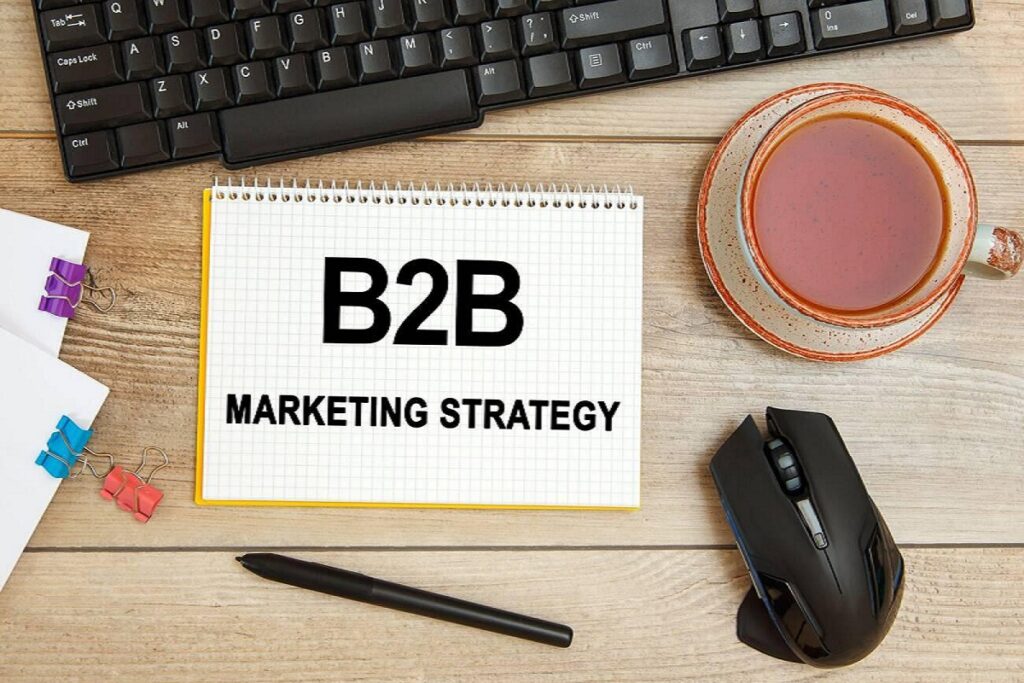B2B marketing, or business-to-business marketing, is the strategic process of promoting products or services to other businesses. Unlike B2C (business-to-consumer) marketing, where the focus is on individual consumers, B2B marketing targets organizations that utilize your offerings to enhance their operations, improve their products, or serve their own customers.
In today’s interconnected business landscape, B2B marketing plays a pivotal role in driving growth and establishing lasting partnerships. It’s about understanding the unique needs and challenges of other businesses and crafting compelling messages that resonate with their decision-makers. Effective B2B marketing goes beyond generating leads; it’s about building trust, fostering relationships, and creating mutually beneficial partnerships that stand the test of time.

In this comprehensive guide, we will delve into the key aspects of B2B marketing, providing you with actionable insights and strategies to elevate your efforts. We’ll explore how to:
- Identify and understand your target audience: We’ll discuss the importance of defining your ideal customer profile and conducting thorough market research to gain valuable insights into your potential customers.
- Develop a winning B2B marketing strategy: You’ll learn how to set clear goals, choose the right marketing channels, and create compelling content that resonates with your target audience.
- Build relationships and nurture leads: We’ll explore strategies for fostering strong connections with potential and existing customers, guiding them through the sales funnel, and converting them into loyal clients.
- Measure and analyze your results: We’ll discuss the importance of tracking key performance indicators and utilizing analytics to optimize your B2B marketing strategy.
By the end of this guide, you’ll have a solid understanding of B2B marketing principles and the tools you need to create a successful strategy tailored to your business. So, let’s dive in and unlock the power of B2B marketing!
Table of Contents
Understanding Your Target Audience: The Foundation of Successful B2B Marketing

In the realm of B2B marketing, understanding your target audience isn’t just important – it’s essential. Unlike B2C marketing, where you’re appealing to individual consumers, B2B marketing involves connecting with other businesses. These businesses have unique needs, pain points, and decision-making processes. To succeed, you need to tailor your marketing efforts to resonate with these specific characteristics.
Identifying Your Ideal Customer Profile (ICP)
Your ideal customer profile (ICP) is a detailed description of the type of business that would benefit most from your products or services. It goes beyond basic demographics like industry and company size. Consider factors like:
- Company goals and challenges: What are they trying to achieve? What obstacles are they facing?
- Budget and decision-making process: How much are they willing to spend? Who is involved in the buying decision?
- Tech stack and infrastructure: What tools and technologies do they currently use?
- Company culture and values: What’s important to them?
By clearly defining your ICP, you can focus your marketing efforts on the businesses most likely to convert into customers.
Conducting Market Research
Market research is the process of gathering information about your target audience and the broader market. This can involve:
- Surveys and interviews: Directly asking your target audience about their needs and preferences
- Analyzing competitor strategies: Seeing what’s working for other businesses in your space
- Monitoring industry trends: Staying on top of the latest developments in your field
Market research helps you gain a deeper understanding of your target audience, their pain points, and how your products or services can provide solutions.
Developing Buyer Personas
Buyer personas are fictional representations of your ideal customers. They help you humanize your target audience and understand their motivations, concerns, and decision-making processes.
Each buyer persona should include details like:
- Job title and responsibilities
- Goals and challenges
- Information sources and preferred communication channels
- Pain points and objections
By creating detailed buyer personas, you can tailor your B2B marketing messages and content to resonate with different segments of your target audience.
Developing a B2B Marketing Strategy: Your Roadmap to Success
Once you have a solid understanding of your target audience, it’s time to develop a B2B marketing strategy that will guide your efforts and drive results. A well-defined strategy ensures that your marketing activities are aligned with your business goals and resonate with your ideal customers.

Setting Clear and Measurable Marketing Goals
The first step in developing a B2B marketing strategy is to set clear and measurable goals. These goals should be specific, achievable, relevant, and time-bound (SMART).
- Specific: Clearly define what you want to achieve (e.g., increase website traffic by 20%).
- Measurable: Establish metrics to track your progress (e.g., number of leads generated, conversion rates).
- Achievable: Set realistic goals that are within your reach.
- Relevant: Ensure your goals align with your overall business objectives.
- Time-bound: Set a deadline for achieving your goals.
By setting SMART goals, you can track your progress and make adjustments to your strategy as needed.
Choosing the Right Marketing Channels
The next step is to choose the right marketing channels to reach your target audience. There are many options available, including:
- Content marketing: Creating and sharing valuable content (e.g., blog posts, white papers, case studies) to attract and engage your target audience.
- Social media: Building a presence on relevant social media platforms to connect with your audience and share your content.
- Email marketing: Sending targeted emails to nurture leads and build relationships with customers.
- SEO: Optimizing your website and content to rank higher in search engine results pages (SERPs) and attract organic traffic.
- Paid advertising: Running targeted ads on search engines, social media, and other platforms to reach a wider audience.
The best channels for your business will depend on your target audience, budget, and goals. Experiment with different channels and track your results to see what works best for you.
Creating High-Quality, Valuable Content
Content is the heart of any B2B marketing strategy. It’s what attracts, engages, and educates your target audience. Focus on creating high-quality, valuable content that addresses their pain points and provides solutions. This could include:
- Blog posts
- White papers
- Case studies
- Ebooks
- Infographics
- Videos
- Webinars
By consistently creating and sharing valuable content, you can establish your brand as a thought leader in your industry and build trust with your audience.
Utilizing Marketing Automation Tools
Marketing automation tools can help you streamline your B2B marketing efforts and save time. These tools can automate tasks like:
- Email marketing campaigns
- Social media posting
- Lead nurturing
- Data analysis
By automating repetitive tasks, you can free up your time to focus on more strategic activities.
Developing a B2B marketing strategy requires careful planning and execution. By setting clear goals, choosing the right channels, creating valuable content, and utilizing marketing automation tools, you can build a successful strategy that drives results for your business.
Building Relationships and Nurturing Leads: The Heart of B2B Marketing

In the world of B2B marketing, transactions are rarely instantaneous. Building strong relationships and nurturing leads is crucial for long-term success. Unlike B2C marketing, where impulse purchases are common, B2B buying decisions involve multiple stakeholders and a longer sales cycle. It’s about fostering trust, providing value, and guiding potential customers through their journey towards becoming loyal clients.
The Importance of Building Strong Relationships
B2B marketing isn’t just about generating leads; it’s about cultivating meaningful connections. When you prioritize relationship-building, you create a foundation for:
- Trust and Credibility: Consistent communication and valuable interactions build trust, positioning your brand as a reliable partner.
- Loyalty and Advocacy: Satisfied customers become brand advocates, referring your business to others and contributing to organic growth.
- Repeat Business: Strong relationships increase the likelihood of repeat purchases and long-term partnerships.
Remember, people do business with people they like and trust. Invest time in building genuine connections with your prospects and customers.
Implementing Lead Nurturing Campaigns
Lead nurturing is the process of guiding leads through the sales funnel by providing relevant and valuable content at each stage. It helps you stay top-of-mind, address their concerns, and build trust, ultimately increasing the chances of conversion.
Effective lead nurturing campaigns involve:
- Segmentation: Dividing your leads into groups based on their interests, behavior, or demographics to deliver targeted content.
- Personalized Content: Tailoring your messages and offers to the specific needs and pain points of each lead.
- Multi-Channel Approach: Utilizing various channels like email, social media, and retargeting ads to reach leads where they are most active.
- Consistent Communication: Maintaining regular contact without being overly aggressive or pushy.
Remember, lead nurturing is a marathon, not a sprint. Be patient, provide value, and focus on building relationships.
Utilizing CRM Software
Customer Relationship Management (CRM) software is a powerful tool for managing customer interactions and tracking lead progress. It helps you:
- Centralize Customer Data: Store and organize all customer information in one place for easy access and analysis.
- Track Lead Activity: Monitor lead behavior, interactions, and engagement with your marketing efforts.
- Automate Communication: Schedule and send personalized emails, follow-up reminders, and other communications.
- Analyze and Report: Gain insights into campaign performance, lead conversion rates, and customer behavior.
By leveraging CRM software, you can streamline your lead nurturing efforts, personalize your communication, and make data-driven decisions to improve your B2B marketing results.
Building relationships and nurturing leads is a continuous process that requires dedication and a customer-centric approach. By prioritizing these aspects, you can create a loyal customer base and achieve sustainable growth in the competitive B2B landscape.
Measuring and Analyzing Results: The Key to B2B Marketing Optimization

In the fast-paced world of B2B marketing, it’s not enough to simply implement strategies and hope for the best. Measuring and analyzing your results is crucial for understanding what’s working, what’s not, and where you can improve. By tracking key performance indicators (KPIs) and utilizing analytics tools, you can gain valuable insights into your campaigns and make data-driven decisions to optimize your B2B marketing strategy.
The Importance of Tracking KPIs
KPIs are quantifiable metrics that help you measure the success of your B2B marketing efforts. Some common KPIs include:
- Website Traffic: The number of visitors to your website.
- Lead Generation: The number of new leads captured through your marketing efforts.
- Conversion Rates: The percentage of leads that convert into customers.
- Customer Acquisition Cost (CAC): The average cost of acquiring a new customer.
- Customer Lifetime Value (CLTV): The total value a customer brings to your business over their lifetime.
- Return on Investment (ROI): The overall profitability of your marketing campaigns.
By tracking these and other relevant KPIs, you can gain a clear picture of your marketing performance and identify areas for improvement.
Utilizing Analytics Tools
Analytics tools provide in-depth insights into your B2B marketing campaigns and customer behavior. These tools can track:
- Website Analytics: User behavior on your website, including page views, time on site, bounce rates, and conversion paths.
- Social Media Analytics: Engagement metrics on your social media platforms, such as likes, shares, comments, and follower growth.
- Email Marketing Analytics: Open rates, click-through rates, and conversions from your email campaigns.
- Paid Advertising Analytics: Impressions, clicks, conversions, and cost per acquisition for your paid ads.
By analyzing this data, you can identify trends, understand customer preferences, and optimize your marketing efforts for better results.
Making Data-Driven Decisions
The insights gained from measuring and analyzing your results should inform your B2B marketing decisions. Use the data to:
- Identify High-Performing Channels: Invest more resources in the channels that generate the best results.
- Optimize Campaigns: Make adjustments to your campaigns based on performance data to improve their effectiveness.
- Personalize Content: Tailor your messages and offers based on customer behavior and preferences.
- Refine Target Audience: Identify new segments or refine your existing target audience based on insights.
By making data-driven decisions, you can ensure that your B2B marketing strategy is constantly evolving and improving, leading to better results and a higher ROI.
Remember, measuring and analyzing results is an ongoing process. Regularly review your KPIs, utilize analytics tools, and make adjustments to your strategy based on the data. By adopting a data-driven approach, you can stay ahead of the competition and achieve sustainable growth in the dynamic world of B2B marketing.
Conclusion: Mastering B2B Marketing for Lasting Success
In the dynamic world of B2B marketing, success is not achieved overnight. It requires a deep understanding of your target audience, a well-crafted strategy, and a commitment to building meaningful relationships. By implementing the strategies discussed in this blog post, you can establish a strong foundation for your B2B marketing efforts and pave the way for long-term growth.
Remember, B2B marketing is an ongoing journey. It’s about continuously evaluating your results, adapting your strategies based on data-driven insights, and always striving to provide exceptional value to your target audience. By consistently delivering on your promises, nurturing relationships, and staying ahead of the curve, you can position your business as a leader in your industry and achieve sustainable success in the competitive B2B landscape.
Ready to take your B2B marketing to the next level? We’re here to help.
- Subscribe to our blog: Stay up-to-date on the latest B2B marketing trends, strategies, and best practices by subscribing to our blog. We’ll deliver valuable insights and actionable tips straight to your inbox.
- Download our free B2B marketing toolkit: Get access to a collection of valuable resources, templates, and checklists designed to help you implement effective B2B marketing campaigns.
- Contact us for a free consultation: Our team of experienced B2B marketing professionals is ready to discuss your unique challenges and goals. Let’s work together to develop a customized strategy that drives results for your business.
Don’t let your B2B marketing efforts fall flat. Take action today and start seeing the difference.



